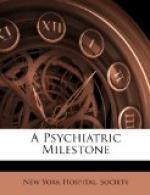and inviting the whole-hearted co-operation of workers
in all fields in a common task of overcoming some of
the greatest difficulties by which civilization and
human progress are confronted. And though the
brunt of this task is borne and must be borne by the
shoulders of medical men, physicians assume the burden
cheerfully, now that they know that they can count
upon the intelligent support and the cordial sympathy
of an ever-enlarging extra-medical aggregate.
No better illustration could be given, perhaps, of
the change in the status of psychiatry in this country
and in the world than the contents of the programme
of our meeting to-day at which a distinguished investigator
from London tells us of the biological significance
of mental disorders, an eminent authority from Paris
explains the relationship between certain diseases
of the nervous system and these disorders, and a leading
psychiatrist of this country speaks upon the contributions
of psychiatry to the understanding of the problems
of life. Psychiatry, like each of the other branches
of medicine, has come to be recognized as one of the
subdivisions of the great science of biology, free
to make use of the scientific method, in duty bound
to diffuse the knowledge that it gains, and privileged
to contribute abundantly to the lessening of human
suffering and the enhancement of human joys.
General practitioners of medicine and medical specialists—at
least the more enlightened of them—welcome
the developing science of psychiatry, are eager to
hasten its progress, and will gladly share in applying
its discoveries to the early diagnosis, the cure,
and the prevention of disease.
That the majority of medical and surgical specialists
and even most of the widely experienced general practitioners,
though constantly coming in contact with major and
minor psychic disturbances, are, however, still far
from realizing the full meaning and value of the principles
and technic of modern psychology and of the newer psychiatry
must, I fear, be frankly admitted.[5] But dare we
blame these practitioners for their ignorance of,
apathy regarding, and even antipathy to, the psychic
and especially the psychotic manifestations of their
patients? Ought we not rather to try to understand
the reasons for this ignorance, this apathy, and this
aversion, all three of which seem astonishing to many
of our well-trained psychologists and psychopathologists?
Are there not definite conditions that explain and
at least partially excuse the defects in knowledge
and interest and the errors in attitude manifested
by those whom we would be glad to see cognizant and
enthusiastically participant? Psychiatrists,
who have taught us to understand and rescue various
types of “sinners” and “social offenders”
will, I feel sure, avoid any moralistic attitude when
discussing the shortcomings of their brethren in the
general medical profession, and will, instead, seek
to discover and to remove their causes.




